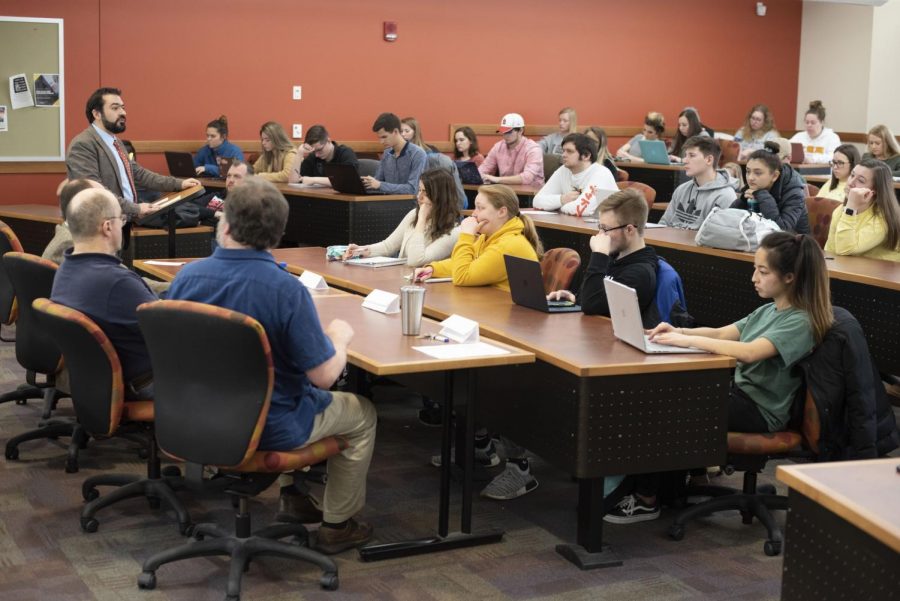COLS hosts panel on terrorism
Students and faculty members engage in a panel to attempt to define terrorism.
April 18, 2019
UW Oshkosh College of Letters and Science professors held the panel “Why is it so Difficult to Define Terrorism” last Friday followed by a question and answer session open to faculty, staff and students.
Event coordinator Alper Camlibel said he hopes students have a better understanding of where the term terrorism originated and how the meaning has changed throughout history.
“Taking a multidisciplinary approach, I decided to organize an academic panel at UWO to discuss these controversial issues together with criminal justice, history and political science professors,” Camlibel said. “I believe that students can better analyze and learn about the definition of terrorism through the interaction of three disciplines, producing results not likely to be obtained by a single or isolated discipline alone.”
Camlibel said the definition of terrorism is still unclear to most people.
“The definition of terrorism is not an easy task and there is no universal agreement on the definition because it is not a physical entity that you can measure, scale or analyze,” Camlibel said. “It is a social construct, meaning nation-states can manipulate the meaning based on their perception of the social and political realities.”
Assistant Professor of History James Frey said “off-the-cuff” responses to things like terrorism or attempts to treat all terrorism as equal is usually the road to policy disaster.
“Context is everything,” Frey said, “I’d like students to walk away realizing they need to look at the world around them more closely and also just be aware of what is going on around the world.”
Associate Professor of History Karl Loewenstein said terrorism is viewed differently depending on the circumstances of the individual’s situation.
“Terrorism is at the center of politics these days so we’re worried about that in a general way,” Loewenstein said. “If you think about what’s going on in Syria and Turkey and all over the world it’s this age-old issue that one person’s terrorist is another person’s freedom fighter.”
Loewenstein said terrorism is hard to define because in some cases political violence is legitimate.
“Some schools say political violence is never legitimate,” Loewenstein said. “Others would argue that in circumstances of extreme duress, violence is the only response that you have to state terror or state power, and thus in moments of crisis the underdogs turn to violence in order to get the attention or the powers to be the change.”
Loewenstein said Russia was the first to demonstrate terrorism as it’s known today.
“They had an oppressive dictatorial regime run by the czar, which didn’t allow freedom of speech. It didn’t allow protest. It didn’t allow complaints and so a movement arose in the 1860s that the only way to respond to this oppressive violent state was returning the violence,” Loewenstein said. “That was really the beginning of modern political terrorism and the ideology that said it was okay to attack your enemies with violence when there was no other way to get a response out of them.”
Loewenstein said some people are more approving of terrorism due to the conditions they experience under certain governments.
“Depending where you are and if you’re sympathetic towards the movement, at what point do you say, ‘Yes, some violence is okay but not too much?,’ and that’s where you get into this question of defining terrorism,” Loewenstein said. “You know, what if you’re the one being oppressed and you’ve seen your family killed and if you speak out you get shot, is shooting someone in return legitimate?”
Frey said the objective is to spread awareness on our campus and in the community.
“The goal of this event, I think, is what the goal of all intellectual discussions should be, to educate and to start a fresh dialogue on the basis of shared knowledge and insight,” Frey said. “If people think about what was said and discuss it or read further on their own, that’s an example of the university pursuing and achieving its mission.”














